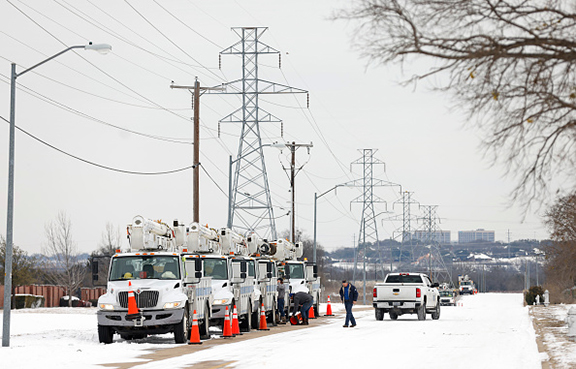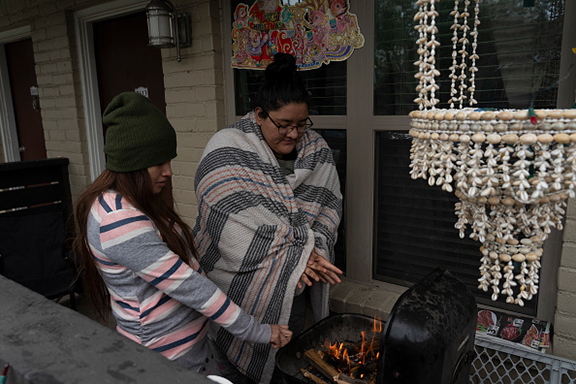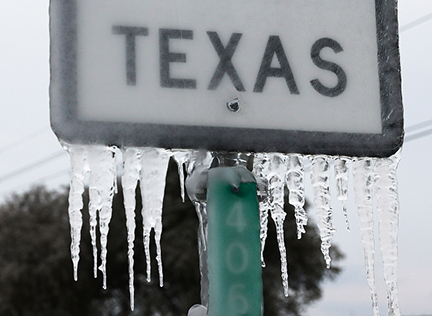When the electricity finally came back on following four catastrophic days of Winter Storm Uri that blasted Texas with subzero and single-digit temperatures and freezing precipitation in February 2021, the devastation was immense: At least 246 Texans were dead, thousands of others had suffered serious medical injuries, tens of thousands faced extensive damage to their homes and property, and thousands of businesses faced billions in economic losses.
An avalanche of lawsuits quickly descended upon Texas courthouses. Four retail power suppliers declared bankruptcy. The major energy companies — including Luminant, Oncor Electric Delivery, CenterPoint Energy, NRG Energy and Constellation Energy — pointed fingers at the Electric Reliability Council of Texas for bad decision-making, at natural gas companies for not delivering the fuel needed to make electricity and at each other for the massive power outages and the outrageously inflated electric prices being charged.
In all, more than 30,000 individuals and small businesses filed wrongful death, personal injury and property damage lawsuits against ERCOT and the energy companies, claiming that their gross negligence and intentional decisions in the days leading up to and during Winter Storm Uri were a significant cause for the widespread blackouts and the injuries. A class action lawsuit brought by an energy trader accused hundreds of natural gas, electric companies and financial institutions of using Winter Storm Uri to manipulate prices and generate billions of dollars in profits.

Even 1,304 insurance companies, in an unprecedented move, joined their old nemeses, plaintiff’s lawyers, suing the energy companies on behalf of their 287,000 Texas customers, alleging the evidence shows that the power generators and distributors were partially or even mostly at fault for some of the power failures that caused so many deaths and injuries. The insurance companies want the energy companies to reimburse them for claims paid to homeowners.
Four years later, not a single witness deposition has been taken and not a single case has been set for trial. And a growing number of legal experts predict that none of those cases will ever be heard by a jury of Texas citizens.
The energy companies involved have so far paid hundreds of millions of dollars — no, not to the victims — to the most prominent and expensive lawyers who are zealously fighting to keep their executives from ever being put under oath and to make sure none of the cases ever go to trial.
On Wednesday, the Texas Supreme Court will hear oral arguments in a case in which 15,000 Texans and small business owners have sued the largest electric transmission and distribution utilities on allegations of wrongful death, personal injury and property damage. They are seeking billions of dollars in damages. The lawyers for the plaintiffs have accused the energy companies of gross negligence and intentional nuisance, claiming that the utilities decided where to cut power, favored some neighborhoods over others, intentionally took steps that made the power shortage worse, ignored numerous warnings to better winterize their systems and lied to their customers about the seriousness of the storm as it approached.
Lawyers for the utilities are asking the justices to dismiss all these cases as frivolous, or at least issue a ruling that makes it considerably more difficult for the plaintiffs to win at trial.
Existing law, according to legal experts, seems to favor the plaintiffs winning their arguments at the state’s highest court. However, most appellate law observers believe a majority of the justices could be interested in writing new law that would allow the energy companies to avoid ever facing trial.
“Based on its previous decisions in Uri litigation, I suspect the Supreme Court’s ruling in this matter will once again be disappointing to the plaintiffs,” said Dallas appellate law expert Chad Ruback. “Thus far, the Supreme Court has held plaintiffs in Uri litigation to a very high burden, and I would be surprised if the court were to change course now.”
Lawyers for the victims say that even if the Texas Supreme Court does not dismiss their cases, it will be at least another year before the first case could go to trial because very little discovery has been done and no witnesses have been deposed.
“Our clients were devastated because of the decisions made by these companies, but they are starting to lose hope that they will ever get their day in court to examine and present the evidence,” said Houston trial attorney Derek Potts, who represents scores of individuals and small business owners in Winter Storm Uri litigation. “Texas law in these type of cases against energy utilities is unnecessarily complicated, and the Texas Supreme Court has not been a friend to people’s constitutional rights to trial by jury.”
“The conduct of these electric companies was so bad the insurance companies are actually on our side in this litigation,” Potts said.
To be sure, legal experts agree that the lawyers for the 30,000 individuals and small businesses face extraordinarily high evidentiary hurdles and long odds to be victorious at trial. Their cases have been consolidated into one multidistrict litigation docket before a specially appointed judge.
Bonanza for Lawyers
To gear up for battle, both sides lawyered to the extreme.
The Texas Lawbook’s research of court records shows that 418 lawyers have been paid during the past four years to work on Winter Storm Uri-related legal matters, including the corporate bankruptcies of Brazos Electric Cooperative, Griddy Energy, Just Energy and the Ector County Energy Center, breach of contract disputes between the power and natural gas companies and 30,000 wrongful death, personal injury and property damage claims that have been consolidated into a multidistrict litigation docket in Houston.
About 300 of the 418 attorneys represent defendants in the consolidated cases.
“Texas law in these type of cases against energy utilities
Houston trial attorney Derek Potts
is unnecessarily complicated, and the Texas Supreme Court
has not been a friend to people’s constitutional rights to trial by jury.”
Jackson Walker partner Tré Fischer, who serves as the primary liaison counsel for the defendants, said that while “the sheer size of the MDL presents coordination challenges,” the collaboration has been excellent.
“We’ve been able to streamline our efforts and leverage the diverse expertise of our combined team to present a coordinated and compelling defense focused on our strategic objectives,” Fischer said. “The litigation has followed its logical course. We raised significant legal challenges early, and these are now being addressed through the appellate process. It’s not unusual for complex cases to involve extensive motion practice and appeals before reaching the discovery phase.”
The Texas Civil Justice League, a business advocacy organization, argued in an amicus brief filed in November that the Texas Supreme Court should dismiss the lawsuits because a $10 billion court victory for the plaintiffs would see the wealth “shift from the 23 million Texans … to the thousands of plaintiffs who filed the lawsuit” and “to the lawyers representing those plaintiffs who stand to recover a few billion for themselves.”

Court records show that 120 trial lawyers from across Texas — including legal superstars such as Potts, Mikal Watts, Greg Cox, Eric Rhine, Ann Saucer, Jason Itkin, Bill Robins, Brent Coon and Larry Taylor — are representing the 30,000 individuals and small business owners.
But the lawyers for the plaintiffs will be paid nothing if they don’t win damage verdicts for their clients because they have been hired on a contingency fee basis.
By contrast, the Winter Storm Uri litigation has already been such a financial bonanza for the corporate law firms representing the energy companies that the Texas Civil Justice League wants the Texas Supreme Court to declare the winner without any trials taking place.
Recognizing the potential for billions of dollars in civil liabilities, energy company defendants such as Oncor, Luminant, CenterPoint, NRG and Calpine tossed budgets aside and hired the most successful and most expensive members of the corporate litigation defense bar, including Allyson Ho and Mike Raiff of Gibson Dunn in Dallas, Anna Rotman of Kirkland & Ellis, Macey Reasoner Stokes of Baker Botts, former Houston judge Pat Mizell of Vinson & Elkins and Susman Godfrey partners Barry Barnett and Vineet Bhatia of Houston — all superstar lawyers whose rates range from $1,400 to $2,200 an hour.
Other corporate law firms hired by the various energy companies in Winter Storm Uri matters include Bracewell, Foley Lardner, Haynes Boone, Hicks Thomas, Jackson Walker, King & Spalding, Morgan Lewis, Norton Rose Fulbright, O’Melveny & Myers, Quinn Emanuel and Yetter Coleman. Lawyers at these firms bill clients from $500 an hour for their most-junior associates to as much as $1,750 for top partners.
Legal industry analysts working exclusively with The Lawbook estimate that the energy companies and other business defendants paid their outside counsel between $390 million and $470 million for legal work done over the past four years.
“The lawyers in this litigation are the biggest financial beneficiaries of Winter Storm Uri so far,” Talen Energy Chief Administrative Officer Andy Wright, the former general counsel of Energy Future Holdings, told The Lawbook in a 2024 interview. “The hourly rates many of the top Texas lawyers are charging today are unbelievably high.”
Texas Supreme Court Showdown
The road through the Texas civil justice system during the past four years has certainly been turbulent for the 30,000 plaintiffs seeking relief.
In late June 2021, the Texas Supreme Court ordered all Winter Storm Uri lawsuits consolidated before Harris County District Judge Sylvia Matthews.
In 2022, Judge Matthews divided the litigation into categories focusing on the claims against the defendants, which included ERCOT, the natural gas companies, the electric transmission and distribution utilities and the power generators.
The court rulings against the plaintiffs started in January 2023, when Judge Matthews dismissed all the lawsuits against the natural gas companies such as Anadarko, Apache, Atmos, Comstock and Energy Transfer. Six months later, the Texas Supreme Court ruled for the first time that ERCOT is a government agency and thus immune from civil lawsuits. And in December 2023, the First Court of Appeals in Houston ruled that the lawsuits against large power generators such as Luminant, NRG, Calpine, Exelon and Sempra Energy had “no basis in law or fact.”

Lawyers for the plaintiffs have filed an appeal of the power generators case to the Texas Supreme Court, but the justices have not yet decided whether to accept the appeal.
“This is the defendants’ playbook — delay, delay, delay and frustrate the plaintiffs and drive a wedge between the plaintiffs and their lawyers,” said former State Bar of Texas President Randy Sorrels, a trial lawyer in Houston.
In the current case before the state justices, the electric transmission and distribution utilities filed a mandamus petition asking the state’s highest court to overturn lower rulings and allow the cases to go to trial.
“It was Mother Nature — not [transmission and distribution utilities] — that blew cold air onto plaintiffs’ properties,” Vinson & Elkins partner Michael Heidler told the justices in a pretrial brief. “Plaintiffs’ gross-negligence claim should be dismissed.”
The energy companies argue that the lawyers for plaintiffs are trying to punish them for following orders issued by ERCOT.
In response, Dallas lawyer Ann Saucer, who represents the 15,000 individuals and small businesses, argues that the TDUs cannot legally hide behind the argument that “ERCOT made them do it” because they “either intentionally or via gross negligence” made the problems worse.

“The TDUs committed malfeasance that ERCOT did not order [by] creating part of the power shortage, misinforming customers and leaving non-preferred customers without power for much longer than the TDUs themselves promised,” Saucer wrote in briefs filed in the case. “As a result of TDUs’ intentional decision not to roll blackouts, those unfortunate customers’ properties were deprived of both heat and water for days on end, resulting in intense physical, mental, economic and emotional suffering for the duration of TDUs’ intentional denial of necessary electricity.”
Saucer said the electric distributors were warned over and over in the years before Winter Storm Uri to take steps to winterize. And she points out that even worse weather conditions hit other areas of the country that did not experience the extreme power grid failures Texas faced.
“TDUs actually compounded the system-wide failures by failing to identify and protect critical infrastructure,” she argued.
The Lawbook contacted Andrew Gould of Arnold & Itkin and Greg Cox of the Mostyn Law Firm for possible interviews, but both declined to comment.
Mandamuses Galore
But litigation experts say the pretrial legal developments in the Winter Storm Uri cases reveal an unhealthy trend among Texas appellate courts to increasingly use writs of mandamus to intervene in cases when they believe the trial courts have abused their discretion. The procedure is meant to be used rarely, according to experts, but petitions for mandamus have already been employed by lawyers for the energy companies multiple times.
“Mandamus is supposed to be a drastic and extraordinary remedy that is to be used only when trial judges clearly go outside the bounds of their authority and should not be granted just because the lawyers disagree with a trial judge’s decision,” said former U.S. District Judge Royal Furgeson, who is the founding dean of the University of North Texas at Dallas College of Law. “While I have no view about the merit of these cases, it would be exceptional if all of them were to just procedurally go away without a single trial actually taking place and without evidence introduced and without witnesses being heard.”
“It is regrettable that we keep finding more and more reasons to take cases away from trial judges and juries,” Judge Furgeson said.
“It was Mother Nature — not [transmission and distribution utilities]
Vinson & Elkins partner Michael Heidler in a pretrial brief
— that blew cold air onto plaintiffs’ properties.
Plaintiffs’ gross-negligence claim should be dismissed.”
Legal experts agree that there is a trend for appellate courts to want to decide cases before any trial record can be developed, and they say that is unfortunate.
“Appellate courts need full trial records to make better decisions,” Judge Furgeson said. “In these cases, the Texas Supreme Court has appointed Judge Matthews to oversee these trials, and she is one of the most qualified and experienced jurists in handling mass tort cases like this in the country.”
Dallas appellate and constitutional law expert Chad Baruch agrees.
“It has never been good to decide these big-ticket cases that impact so many people without having a full trial record,” Baruch said. “I can’t imagine that anyone believes this is a positive development of the law.”
All the legal issues and objections raised in the mandamus petition can easily be handled post-trial during a traditional appeal, the lawyers said.
That being said, no one blames the lawyers for the energy companies for zealously advocating for their clients by filing petitions for mandamus seeking to have the cases dismissed before any of them can go to trial.
But legal experts say the Texas appellate courts have — for better or worse — opened the door to using pretrial mandamus proceedings to “embrace judicial efficiency.”
“It is going to be very expensive to try 15,000 cases,” Houston lawyer Kenneth Held said. “This is such a landmark case, the appellate courts may want to give the trial court some guidance on how to proceed.”
“The best the plaintiffs can probably hope for is that the Texas Supreme Court splits the difference in these cases,” Held said. “The court might strike down all the nuisance claims and send the gross negligence claims back to the trial court with specific instructions on what gross negligence means in cases like this.”
Timeline of events: Winter Storm Uri litigation
2021
Feb. 12 — Gov. Greg Abbott declared a state of emergency a day ahead of Winter Storm Uri’s arrival.
Feb. 13-17 — The storm hit Texas.
Feb. 16 — The first storm-related lawsuit, Donald McCarley v. Electric Reliability Council of Texas, was filed in Nueces County for personal injury due to loss of power.
Feb. 22 — Three wrongful death lawsuits were filed in Harris County. The victims of hypothermia included 11-year-old Christian Pavon of Conroe, and 95-year-old Doyle Aron Austin of Houston.
March 1 — Brazos Electric Power filed for bankruptcy.
March 9 — Just Energy filed for bankruptcy.
March 15 — Retail power company Griddy Energy filed for bankruptcy.
May 1 — Court records show that more than 100 lawsuits representing more than 1,500 alleged victims had been filed in Dallas, Travis and Harris counties over Winter Storm Uri-related injuries.
June 2 — Dallas-based Luminant filed a brief in the Austin Court of Appeals challenging the legal authority of the Public Utility Commission of Texas to artificially reprice electric rates during Winter Storm Uri to $9,000 per megawatt-hour, or 650 percent higher than normal, which cost the company $2.9 billion.
June 30 — The Texas Supreme Court appointed Harris County Judge Sylvia Matthews to be the multidistrict litigation judge and ordered all Winter Storm Uri-related lawsuits filed in Texas state courts to be transferred to her docket.
Aug. 30 — Six months after suing Griddy, Texas Attorney General Ken Paxton announced a settlement that released about 24,000 consumers from paying outstanding bills owed to the bankrupt utility.
Dec. 28 — 131 insurance companies sued the Texas power grid operator and several power-generating companies in Travis County over losses suffered from Winter Storm Uri, which resulted in more than 500,000 insurance claims and approximately $10.3 billion in insured losses.
2022
April 12 — The Ector County Energy Center filed for bankruptcy, citing $400 million in losses during Winter Storm Uri and lawsuits filed by its customers seeking $400 million in damages.
2023
Jan. 26 — Judge Matthews dismissed lawsuits brought by hundreds of plaintiffs against 60 natural gas companies, including Anadarko, Apache, Atmos, Comstock, El Paso, Energy Transfer, Kinder Morgan and XTO, ruling that the gas companies would not have to stand trial for any damage or deaths caused by power outages during Winter Storm Uri because any conduct by those companies was too remote to have caused the damages claimed in the lawsuits.
Feb. 9 — CirclesX Recovery, an energy trader that represents thousands of Texas energy customers, filed a lawsuit in Harris County claiming that large energy companies and financial institutions, including Energy Transfer, Kinder Morgan, BP, Conoco Phillips and CenterPoint Energy, engaged in an Enron-style scheme to cut off gas production or divert supplies into storage days ahead of freezing temperatures that would eventually cripple the Texas power grid.
March 17 — The Third Court of Appeals in Austin ruled in favor of Luminant and other power providers that the Texas PUC’s decision to raise electric rates to $9,000 per megawatt-hour during Winter Storm Uri was illegal. The ruling was a multibillion-dollar defeat for Calpine Corporation, Talen Energy, TexGen Power and other power generators who sold the electricity at the $9,000 rate.
June 23 — The Texas Supreme Court ruled that ERCOT is a government agency and is entitled to sovereign immunity from civil lawsuits, which ended thousands of personal injury, wrongful death and property damage claims filed against the entity.
Dec. 14 — The First Court of Appeals in Houston handed large power generators in Texas, including Luminant, NRG, Calpine, Exelon and Sempra Energy, a huge, multibillion-dollar defense victory by ruling that wrongful death, personal injury and property damage cases against the generators by victims of Winter Storm Uri have “no basis in law or fact.”
2024
April 2 — The Fourteenth Court of Appeals in Houston ruled that 20,000 plaintiffs in wrongful death, personal injury and other Winter Storm Uri-related lawsuits seeking billions of dollars in damages from Texas electric transmission and distribution utilities that provide power via wires connected to people’s homes — CenterPoint Energy, Oncor Electric Delivery and American Electric Power— may move forward to trial on allegations of gross negligence and intentional misconduct.
June 14 — The Texas Supreme Court reversed the Austin Court of Appeals’ decision that the PUC violated state law.
Nov. 6 — Judge dismissed CirclesX lawsuit claiming market manipulation.
Dec. 6 — CirclesX filed notice of appealed. Case assigned to the First Court of Appeals in Houston.
Dec. 23 — The Texas Supreme Court agreed to hear an appeal by Texas electric transmission and distribution utilities that the Houston Court of Appeals erred in allowing lawsuits for wrongful death, personal injury and other Winter Storm Uri-related injuries to go to trial against companies such as CenterPoint Energy, Oncor Electric Delivery and American Electric Power. Oral arguments are set for Feb. 19.
2025
Jan. 9 — Oklahoma’s attorney general sued 17 natural gas providers, including Symmetry Energy Solutions, Enable Midstream Partners, Constellation NewEnergy-Gas Division, BP Energy, Chevron U.S.A., Macquarie Energy, NextEra Energy Marketing and Southwest Energy, on allegations of market manipulation and violating the state’s antitrust and consumer protection laws.
Feb. 4 — Lawyers for 15,000 individuals and businesses filed a petition for writ of mandamus with the Texas Supreme Court seeking to reverse the Dec. 21 decision by the First Court of Appeals in Houston dismissing the wrongful death, personal injury and property damage cases against power generators.
